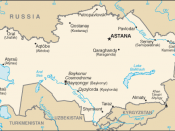The primary legislative act regulating taxation in the Republic of Kazakhstan is the Law of the President of the Republic of Kazakhstan (previously Edict No. 2235) "Concerning Taxes and Other Payments to the Budget," also known as the "Tax Code." The Tax Code was introduced on the 24th of April 1995 with effect from the 1st of July 1995.
Since enactment, the Tax Code has been repeatedly amended, the most recent of which was dated 5 July 2000 and with force from January 2001. Further changes are likely to be made to the Tax Code during this year.
Kazakhstan is also preparing to introduce a completely revised Tax Code to Parliament for approval in the fall of 2000. The new Tax Code is currently expected to be in force by 1 July 2001, although this date is subject to change.
With few exceptions, the statutory income tax rate for Kazakhstan legal entities, branches of foreign legal entities, joint ventures and wholly foreign-owned legal entities is now 30%.
Foreign and Kazakhstan legal entities, registered and operating in a target region, called a special economic zone, may be subject to an income tax rate of 20%.
Until April 1, 1999, there were four special economic zones in place: Kyzyl Orda, Astana, Lisakovsk and Zhairem-Atasui. Since legislative changes which were effective between April 1999 and July 2000, there are no remaining special economic zones in Kazakhstan. Entities established in one of the special economic zones that no longer exist should continue to receive the tax or customs benefits previously received under special economic zone status for a specified period of time.
In addition to income tax, permanent establishments (permanent establishments includes branches) of foreign legal entities are subject to 15% tax on their net income. Similarly, Kazakhstan legal entities are subject to a...



Tax
You've written a good essay on a complex topic. Aside from such provisions as a value added tax, it is interesting to note the similarities to American tax law. At the end of your essay, you can delete the second occurrence of the
caption "Stability of Tax Regime."
6 out of 6 people found this comment useful.